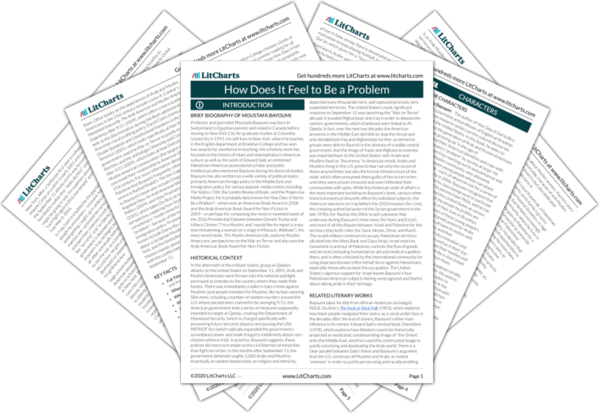Omar Quotes in How Does It Feel to Be a Problem?
“But look, Omar,” she said. “I'm a friend of your family. And just for the future, I'd like to warn you.” She paused. “This,” she said, pointing to the line on his résumé that Omar was most proud of, his work at Al Jazeera, “this could work against you in the future. Especially if you want to get work with people who feel threatened by the whole Arab thing.”
“Look. It's like this,” Eyad, a portly young Egyptian, explained to me. He leaned in to the table and put his weight behind his words. “Before, they went after the Jews, the Italians, the Irish. And now it's our turn. Everybody gets their turn. Now it's just the Muslims.” He leaned back. To my ears these young men were living uneasily in an unresolved contradiction.
They acknowledged that the rights of Muslims were being unfairly trampled on, but they were seduced by the lure of owning a marketable skill (the Arabic language) that was currently in high demand. What they didn't voice was the idea that the culture of the FBI would be changed by their contributions to the Bureau or that civic participation was calling them to serve. They saw an open avenue, wide and empty of traffic, to a job, a profession, a career. It was as if the grinding pressure on their generation to succeed at any cost was taking precedence over everything else.

Omar Quotes in How Does It Feel to Be a Problem?
“But look, Omar,” she said. “I'm a friend of your family. And just for the future, I'd like to warn you.” She paused. “This,” she said, pointing to the line on his résumé that Omar was most proud of, his work at Al Jazeera, “this could work against you in the future. Especially if you want to get work with people who feel threatened by the whole Arab thing.”
“Look. It's like this,” Eyad, a portly young Egyptian, explained to me. He leaned in to the table and put his weight behind his words. “Before, they went after the Jews, the Italians, the Irish. And now it's our turn. Everybody gets their turn. Now it's just the Muslims.” He leaned back. To my ears these young men were living uneasily in an unresolved contradiction.
They acknowledged that the rights of Muslims were being unfairly trampled on, but they were seduced by the lure of owning a marketable skill (the Arabic language) that was currently in high demand. What they didn't voice was the idea that the culture of the FBI would be changed by their contributions to the Bureau or that civic participation was calling them to serve. They saw an open avenue, wide and empty of traffic, to a job, a profession, a career. It was as if the grinding pressure on their generation to succeed at any cost was taking precedence over everything else.











